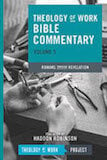How I Learned to Listen to My Coworkers
Blog / Produced by The High Calling
When I decided to take my faith to the office, I would pray as I drove to work and parked my car that I would remember to be God’s representative in that oil company’s exploration office. But I was shocked to realize that when I got into my office and looked at what I had to do, I didn’t even give God a thought until I got back in my car to drive home.
Then I tried praying for people in the office after I arrived, but realized I didn’t know anything about them.
So I finally put a 3x5 card in the lap drawer of my desk with a pencil on top of the card. When anyone came into the office, I opened the lap drawer and took out the pencil, glancing at the card. I’m not sure how the message on the card was worded but in effect it said to me, “Keith, pay attention to this person. I may have a message for you from them. God.”
That’s how I began to listen to people and ask them how they were. Over the next few months, something started happening. I discovered that most people had problems, pain, frustration, hopes, and dreams they didn’t usually talk about. Those sophisticated business people came in and just sort of opened themselves and let me see their inner lives. And I soon realized that there were enormous personal problems, loneliness, and searching among people in the oil exploration business.
Several years later, I had met some other Christians in the oil business through my good friend Bill Yinger (who encouraged me and helped me more than he knows). Through Bill, I was hired by another oil company and subsequently became that company’s exploration manager. One day when the vice president in charge of our office was overseas, I said silently, “Okay, Lord, I’m going to get involved with any of these people who want to pray about this business.” I didn’t think we ought to meet together on company time, but I thought, “I’ll have a meeting with them before work and maybe we can find out how to be Christian business people.”
Among the men and women in that office were a Buddhist, a Jewish fellow, all kinds of “believers,” and some who did not claim any kind of religion. But I went to their offices to invite them and, since I was a manager, they listened to me.
I said, “We’re on a pretty fast track in this business, and I’d like to pray about what’s happening and what we’re doing here together. I’m a Christian. I don’t know if you are or not, but if you’d like to pray together, I’m going to come early, at seven thirty, and have a little coffee. If you want to come, fine. If you don’t, no sweat.” That was Friday, and I said, “We’ll start Monday—for any of you who’d be interested.” (I had a conference room next to my office that would give us privacy.)
All that weekend I kicked myself all over the house. “Why’d you do that?” I said. “You’re a stupid fool!” (Not that I have any pride, you understand.) I often have what at our house we call “cringers.” For instance, sometimes I have said something at a party that seemed “real clever” at the time, but when I’ve gotten home and remembered what I had said, I would grimace and shake my head, saying, “Oh no, why did I say that?” And so I was cringing all during the weekend about having been so vulnerable at the office. What if no one came? I’d feel terrible.
But on Monday, I went in early, and of the fourteen people in that office, almost all showed up. We began to talk together and share our feelings. After a few weeks, the secretaries began to pray for the business and for the executives in our office, and the executives began to pray for the secretaries and for each other. We learned that we were all just persons who were struggling to live the best way we could in our circumstances.
After six months, people from other companies would walk in the office and say things like, “What kind of a deal do you have here? These people are sure friendly.” We didn’t necessarily say anything about Jesus to visitors; we just loved them. I kept a journal through all this time and was amazed at the way my life changed. I felt more a part of the lives of the people with whom I worked. As I listened and let them know me, I began to feel love for them. And in a way I could not understand, I felt deeply that we were not alone in that hard-driving, secular business we were building.
Questions for Reflection:
- Read 1 John 4:17. “When we take up permanent residence in a life of love, we live in God, and God lives in us. That way love has the run of the house, becomes at home and mature in us." Is your daily work a life of love?
- Think about the people around you in your daily work. How can you pray for them?
- Does your daily work allow the opportunity for a group devotion or prayer? What might that look like?
____________________________________________
Keith Miller was the founding director of Laity Lodge.





